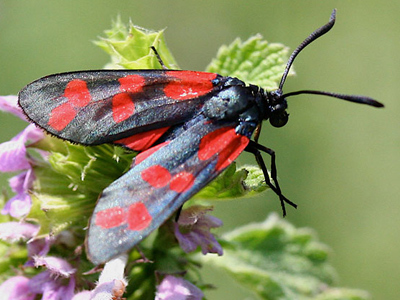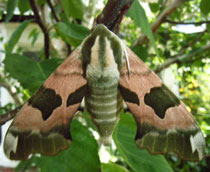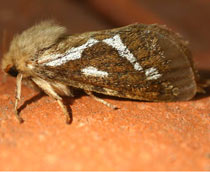
See if you can get full marks in this quiz.
Insects and Spiders - Moths
Moths are close relations to butterflies. Contrary to the usual idea that moths are small brown triangles, they come in a huge variety of shapes, sizes and colours. There are approximately 2,500 species of British moths and only six of these species eat clothes! Dirty clothes that are hidden in dark places are preferred.
Don't forget to click on the images to enlarge them.
To see a larger image, click on the picture.
1 .
What is the name of this moth?
Lunar Hornet Moth
Muslin Footman
Goat Moth
Gypsy moth
- Order: Lepidoptera
- Family: Sesiidae
- Genus: Sesia
- Species: S. bembeciformis
- This is a scarce species.
- The larvae tunnel in the trunks of willow trees.
- An incredible example of mimicry in that birds avoid these moths because they think they are wasps!
2 .
What is the name of this moth?
Festoon
Lime Hawk-moth
Large Emerald
Oak Eggar
- Order: Lepidoptera
- Family: Geometridae
- Genus: Geometra
- Species: G. papilionaria
- A striking and large moth.
- This species usually sits with its wings open like a butterfly.
- A night-flyer between June and August and is attracted to light.
- The larvae feed mostly on birch.
3 .
What is the name of this moth?
Sallow Kitten
Turnip Moth
Muslin Footman
Common Swift
- Order: Lepidoptera
- Family: Notodontidae
- Genus: Furcula
- Species: F. furcula
- The caterpillars of this species feed on poplar and willow.
- Widely distributed throughout a range of habitats, although it prefers damp woodland.
- Adults appear occasionally at light in very small numbers.
4 .
What is the name of this moth?
Emperor Moth
Scalloped Hook-tip
Six-spot Burnet
Peach Blossom
- Order: Lepidoptera
- Family: Drepanidae
- Genus: Thyatira
- Species: T. batis
- A particularly pretty moth.
- Flies at night during the months of June and July.
- Occasionally has a second brood in August or September.
- This moth is attracted not only to light, but also to sugar!
5 .
What is the name of this moth?
Lime Hawk-moth
Common Swift
Gypsy Moth
Peach Blossom
- Order: Lepidoptera
- Family: Sphingidae
- Genus: Mimas
- Species: M. tiliae
- The wingspan is between 70-80mm, with the female being larger.
- This moth can be seen flying at night during May and June.
- The species is spreading to the north.
- Adult moths do not feed.
6 .
What is the name of this moth?
Large Emerald
Scalloped Hook-tip
Nine-spotted moth
Goat Moth
- Order: Lepidoptera
- Family: Cossidae
- Genus: Cossus
- Species: C. cossus
- The larvae live in the trunks of trees eating the wood.
- It can take up to five years to develop to the pupa stage.
- Adults have no working mouthparts therefore they cannot feed.
- Instead, they find a partner, mate and produce the next generation.
7 .
What is the name of this moth?
Six-spot Burnet
Nine-spotted moth
Festoon
Lunar Hornet Moth
- Order: Lepidoptera
- Family: Arctiidae
- Genus: Amata
- Species: A. phegea
- This species mimics a moth of similar appearance, Zygaena ephialtes.
- Zygaena ephialtes is poisonous to birds, therefore birds leave this moth well alone!
- Prefers a habitat of drier, open areas with trees and shrubs.
8 .
What is the name of this moth?
Festoon
Sallow Kitten
Emperor Moth
Lunar Hornet Moth
- Order: Lepidoptera
- Family: Saturniidae
- Genus: Pavonia
- Species: P. pavonia
- Widely distributed in the UK.
- The flight is swift meaning it can be mistaken for a butterfly.
- Female is larger and the antennae are not feathered.
- They feed on woody plants including heathers, bramble and hawthorn.
9 .
What is the name of this moth?
Lime Hawk-moth
Common Swift
Sallow Kitten
Turnip Moth
- Order: Lepidoptera
- Family: Hepialidae
- Genus: Korscheltellus
- Species: K. lupulina
- Larvae feed on roots of plants underground.
- Have been known to be an agricultural nuisance.
- Common and widely distributed throughout the UK.
- Female similar to male, but larger in size with paler markings.
10 .
What is the name of this moth?
Emperor Moth
Six-spot Burnet
Oak Eggar
Festoon
- Order: Lepidoptera
- Family: Zygaenidae
- Genus: Zygaena
- Species: Z. filipendulae
- This moth is attracted to scabious, thistles and knapweeds.
- A day-flying moth and when the sun is shining, it has a slow buzzing flight.
- Widespread across Britain, predominantly coastal in Scotland.
**Unlimited Quizzes Await You! 🚀**
Hey there, quiz champ! 🌟 You've already tackled today's free questions.
Ready for more?
Ready for more?
🔓 Unlock UNLIMITED Quizzes and challenge yourself every day. But that's
not all...
not all...
🔥 As a Subscriber you can join our thrilling "Daily Streak" against other
quizzers. Try to win a coveted spot on our Hall of Fame Page.
quizzers. Try to win a coveted spot on our Hall of Fame Page.
Don't miss out! Join us now and keep the fun rolling. 🎉
**Unlimited Quizzes Await You! 🚀**
Hey there, quiz champ! 🌟 You've already tackled today's free questions. Ready for more?
🔓 Unlock UNLIMITED Quizzes and challenge yourself every day. But that's not all...
🔥 As a Subscriber you can join our thrilling "Daily Streak" against other quizzers. Try to win a coveted spot on our Hall of Fame Page.
Don't miss out! Join us now and keep the fun rolling. 🎉

















